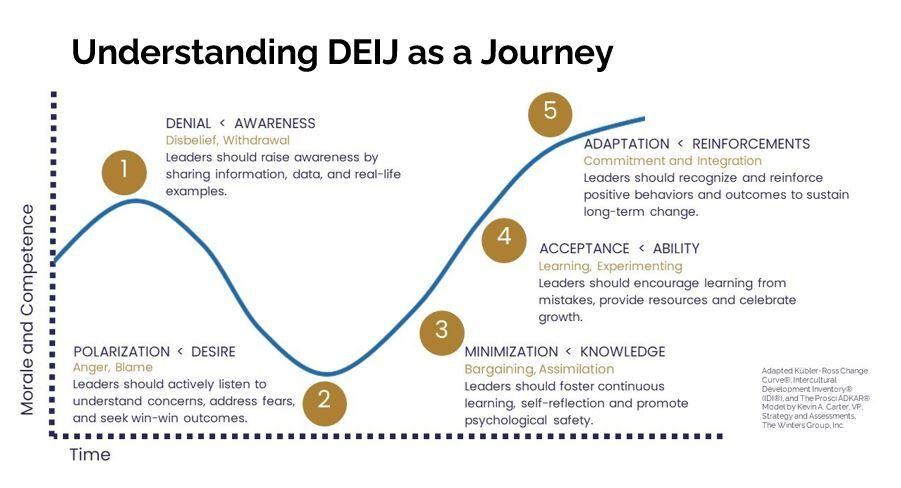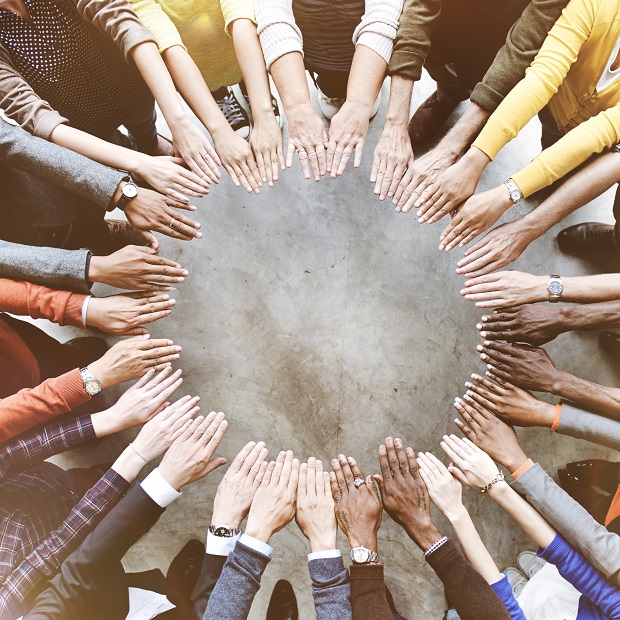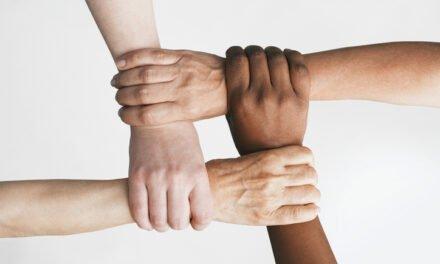
Polarization permeates my life. From discussions about the prevalence of racism, to the role of Christian doctrine … and even decisions about my diet to better my body and protect the planet — I am often emotionally overwhelmed. I attempt to use the model below when I enter these discussions.

This Diversity, Equity, Inclusion, and Justice (DEIJ) framework helps me attempt to be a bridge within polarized discussions. This path demands an open mindset, deepening self-awareness and awareness of others, empathetic communication, and strong listening skills. This framework is what I find most valuable about DEIJ. Here, I will demonstrate how it can be used to find a middle ground within the divisive issues at the core of my existence.
Race/Racism
As a Black individual, incidents of racism have shaped my worldview. Racism has had me both question and champion my competence, lessened my trust in institutions, made me guarded in some interpersonal relationships, and committed me to advocate for safety, security, and justice for others. Yet, my academic and professional pursuits, and my education in philosophy and finance have helped me develop a lens to examine racism beyond the visceral reactions it often evokes. My passion for addressing racism is rooted in both my lived experience and the philosophical belief that claims of racism must be substantiated, not presumed. This approach aligns with the first stage of the framework, where to address the denial of racism’s existence, one must raise awareness through a careful examination of the facts.
Polarization on racial issues often stems from a lack of understanding or unwillingness to engage in meaningful self-reflection and dialogue. In my role in DEIJ, I have witnessed the power of fostering conversations that move beyond blame and anger to seek win-win outcomes. Such dialogue acknowledges the pain of the past while striving for an equitable future.
The transition from minimization to knowledge is especially pertinent to race relations. It is about recognizing the systemic nature of racism, while acknowledging individual self-responsibility.
I have learned that while my story is part of a larger narrative of racial injustice, it does not negate the possibility of personal obstruction spots or the capacity for change within individuals and institutions.
Plant-Based Eating
My transition to plant-based eating was necessitated by a health scare — a heart attack. This life-altering event shifted my approach from impulsive eating to a structured, vegan diet, which became essential for my well-being. Adopting a vegan diet became my lifeline, transforming my health in ways that resulted in incredible benefits. Yet, this path has not been without its pitfalls. My genetic makeup, which includes impaired folate and vitamin B12 metabolism, required me to supplement vitamin B12, a common need in vegan diets.
Navigating these challenges, the DEIJ framework proved invaluable. It guided me from a polarized viewpoint, where a single dietary approach is often fiercely advocated, to a more personalized, holistic understanding of nutrition. This perspective benefited my health and aligned with broader well-being considerations, encompassing environmental and cultural factors.
As I integrated these insights into my life, memories of my grandmother and mother preparing “eggs over easy” reminded me of our deep cultural connection with food — linking food with love, tradition, and care. This legacy continues as I observe my wife cooking healthy plant-based meals for our family. Through the DEIJ lens, the journey from minimization to adaptation encourages us to appreciate the intricate fabric of our culinary choices, honoring traditions while embracing new, healthier habits.
This is especially important for African Americans. Understanding epigenetics in this context is vital. Lifestyle choices, including diet, can activate or deactivate certain genes, impacting long-term health. Many African Americans are predisposed to conditions like hypertension and diabetes. We can make choices that favor healthier genetic expressions by integrating epigenetic knowledge into our diets. This doesn’t mean we must forsake our rich culinary traditions. Instead, we can creatively adapt them. For instance, preparing soul food with healthier ingredients or cooking methods that maintain flavor, but lower health risks can honor our cultural identity while promoting well-being.
DEIJ prepares an intentional plate where the foods nourish our bodies and support the planet while respecting the diversity of our cultural and individual needs.
Christianity and Ethics
Faith has been my compass, guiding me through storms such as my mother’s dementia. As a Christian in the United Methodist tradition, my belief in God is a source of strength and inspiration. However, this faith is not limitless. I am acutely aware of the historical and ongoing injustices perpetrated in the name of Christianity — from the genocide of Native Americans, to support for slavery, to discrimination against women, immigrants, and the LGBTQ+ community. We Christians must recognize that other religions and faiths are equally crucial to their followers and are neither right nor wrong in their beliefs.
So many, throughout history, have wielded their faith like a weapon. And they have done so with a mental and philosophical certainty that scares me. Herein lies the complexity of faith: Faith can be a sanctuary for the spirit and a weapon of moral superiority. The DEIJ framework offers a pathway from acceptance to ability, where we learn and discern from our sources, acknowledging past mistakes while striving for a future that aligns more closely with the principles of love and justice central to Christianity. Christian beliefs teach us to love our neighbor.
To be Christian, one must proactively confront and reconcile the ethical dilemmas between faith and historical injustices. If you do not, it is pure mysticism.
Acknowledging and Addressing Counterarguments
In embracing the DEIJ framework, one must prepare to engage with and address counterarguments. These counterpoints offer an opportunity to deepen our understanding and refine our approach. Below are three common counterarguments to DEIJ work, coupled with the leadership strategies listed on the chart, to thoughtfully address them.
- Resistance to Change: Critics argue that changes sparked by DEIJ are unnecessary and create more division. To counter this, leaders must tap into the “Polarization to Desire” stage of the DEIJ journey, transforming denial and anger into constructive dialogue. Leaders can communicate how DEIJ initiatives foster fairness by equipping everyone with the tools to actively listen and respond to the concerns of individuals who are like and different from themselves.
- Perceived “Reverse Discrimination”: Some view DEIJ initiatives as favoring some groups, potentially leading to reverse discrimination. This argument is where the “Minimization to Knowledge” stage is pivotal. Leaders must educate stakeholders on equity versus equality. Clarifying that equity is about acknowledging and addressing unequal starting points can help position DEIJ initiatives as pathways to true meritocracy, where individuals are supported according to their specific circumstances and can thus achieve according to their potential.
- Overemphasis on Identity: The argument that DEIJ initiatives overemphasize individual identities at the expense of organizational cohesion can be addressed through the “Acceptance to Ability” stage. In response, leaders demonstrate how embracing diverse identities contributes to the organization’s collective intelligence, leading to improved problem-solving and innovation. The “Adaptation to Reinforcements” stage further solidifies this by highlighting how integrating DEIJ principles strengthens organizational unity and advances shared goals.
By acknowledging these counterarguments openly, leaders can demonstrate their commitment to inclusive dialogue. The DEIJ framework is not a rigid set of rules, but a dynamic path that invites continuous learning and growth. Addressing these counterarguments directly, with empathy and understanding, reflects what DEIJ stands for — creating spaces where all voices are heard and everyone feels valued and empowered to contribute to the collective success.
Fostering Common Ground
In my life, pursuing common ground has been a conscious effort to cultivate a non-anxious presence, where the goal is not to win arguments but to deepen understanding. It is a mindset that recognizes the validity of others’ viewpoints, even when they diverge significantly from mine.
Overall, I think I have succeeded more than failed in this effort.
My professional expertise in DEIJ and firsthand experiences as a Black individual, a vegan, and a Christian have informed this approach. Each identity has been a vantage point from which I have observed and engaged with polarization. By employing the DEIJ framework, I have learned to navigate these complex terrains with a curious mind, seeking to understand rather than to judge and to find empathy rather than hostility.
In practice, this means creating spaces where difficult conversations occur, fostering an atmosphere of psychological safety where individuals feel seen and heard, and cultivating the skills necessary to bridge divides.


















